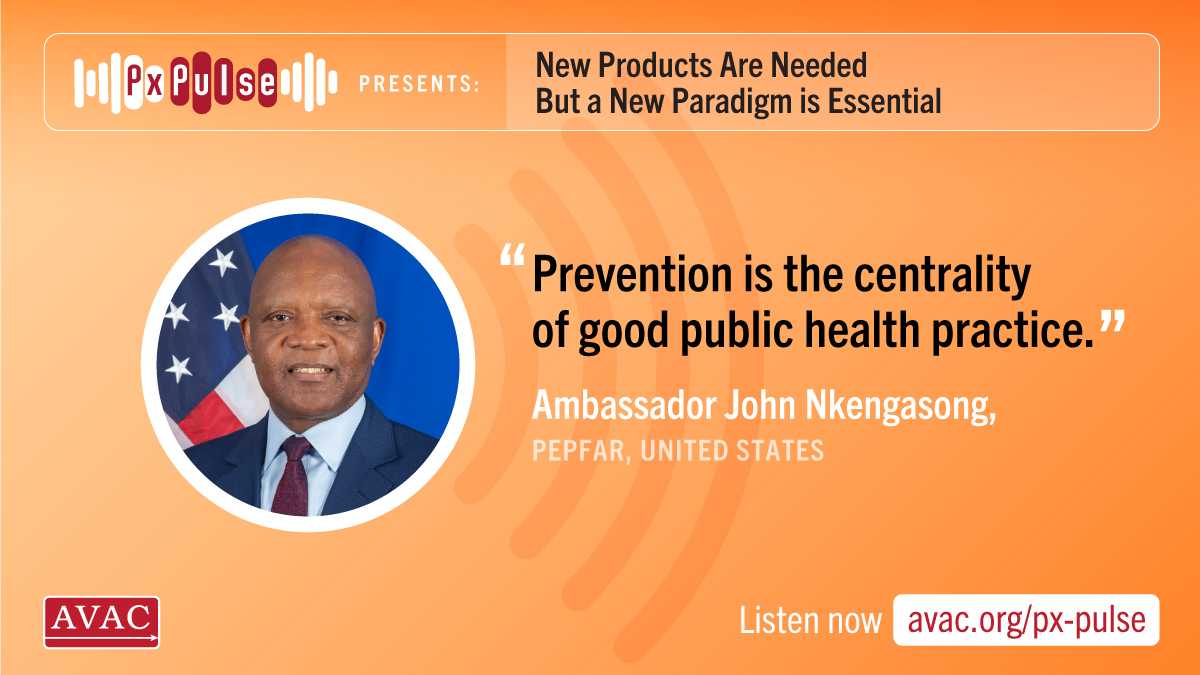Renewed Commitment to Expanding Access to All Existing HIV Prevention Options Must be a Global Priority
Kay Marshall, +1 (347) 249-6375, [email protected]
January 18, 2023 — Today, Janssen Pharmaceutical Companies of Johnson & Johnson and partners announced that the Mosaico study, a large-scale HIV vaccine efficacy study also known as HVTN 706/HPX3002, was stopped early for non-efficacy. The study took place in several countries in North and South America and Europe to test the safety and efficacy of the adenovirus26-based vaccine regimen among 3,900 cis-gender men and transgender individuals who have sex with cis-gender men and/or transgender individuals. An independent data and safety monitoring board, at a scheduled review of the trial data, found the regimen to be safe, but that it did not meet the pre-defined criteria for efficacy and recommended that the study be stopped and trial participants informed.
The Mosaico study used a similar version of the vaccine regimen in its companion study, the Imbokodo trial, which was stopped in August 2021 as it also did not significantly reduce the overall risk of HIV acquisition among over 2,600 cis-gender women in five sub-Saharan African countries.
“We always hope that efficacy trials will show positive results that lead to new prevention options,” said Mitchell Warren, Executive Director of AVAC. “It is disappointing that this particular vaccine candidate did not work, but Mosaico was an important, well-designed and well-conducted trial, especially in the midst of the COVID-19 pandemic and the roll-out of oral PrEP. The trial demonstrated that it is not only possible to design and conduct an HIV vaccine trial in the current environment, but that it is essential to do it.”
“The hard truth is the science of HIV vaccine development is extremely challenging,” Warren added, “but this is not the time to dial back support for ongoing research. Far from it – HIV remains a global threat, and a safe, efficacious and accessible HIV vaccine is still needed to provide a durable end to the pandemic. At the same time, we now have more proven HIV prevention options than ever before, but they are not reaching everyone who needs and wants them. Even as researchers continue the necessary work of accelerating HIV vaccine research, the broader HIV response must act as if we may never have a vaccine and prioritize the roll out of existing prevention options and research for additional ones. Ending this pandemic requires simultaneous action on multiple fronts of research, development and delivery.”
HIV vaccine research is complex and difficult. It is imperative that researchers work together and glean as much information as possible from the research process and from each study. Mosaico and the ongoing PrEPVacc efficacy study will both provide important information to help refine future vaccine research; various antibody studies are providing key information to inform both antibody-based prevention and vaccine development; and basic science research and early phase human studies are providing still more clues to what is needed to develop a safe and effective HIV vaccine.
“While this outcome is a disappointment, it must be seen as a result of the necessary effort to find, and keep the hope alive for, an HIV vaccine. This is, therefore, not an end, but one more addition to the knowledge it will take to find an HIV vaccine. We salute the nearly 4,000 Mosaico trial participants and the communities that were part of this important study. They join hundreds of thousands of previous HIV vaccine trial participants who have selflessly helped in this important global health endeavor,” said Ntando Yola, from the Desmond Tutu Health Foundation and Advocacy for Prevention of HIV in Africa (APHA) in South Africa. “As advocates we stand with communities across the globe who want to see an end to HIV. Working through the Coalition to Accelerate and Support Prevention Research (CASPR), we will continue to work with researchers, funders and policy makers to ensure that community voices, concerns and needs are at the forefront of ethically conducted, participatory HIV prevention research.”
“AVAC congratulates the trial teams at sites across the globe for their work on a superbly run study,” said Stacey Hannah, AVAC’s Director of Research Engagement and CASPR Project Director. “We applaud Janssen for working in collaboration with the HIV prevention community, for their leadership in HIV vaccine research and for their longstanding commitment to robust stakeholder engagement through the Good Participatory Practices (GPP) Guidelines that must be continued to maintain trust in vaccines and in research, irrespective of trial results. In fact, this commitment to GPP helps ensure all of us navigate disappointing results.”
“We’re proud to have worked with the Mosaico trial team to ensure advocate and community voices were heard in the design of the trial, especially around integrating oral PrEP into the design,” added Hannah. “While it is very disappointing that this vaccine will not move forward, this trial was a success in its innovative design and conduct, and provides important lessons for HIV prevention efficacy trials in the years to come.”
The Mosaico study evaluated whether an adenovirus26-based vaccine with a Clade C and mosaic gp140 vaccine regimen could safely and effectively reduce the rate of new HIV infections among cis-gender men and transgender individuals having sex with cis-gender men and/or transgender individuals in Argentina, Brazil, Italy, Mexico, Peru, Poland, Spain, and the United States. Participants received a total of four vaccines over twelve months of either a prime-boost vaccine regimen of a mosaic viral-vectored vaccine, Adeno26.Mos4.HIV (Ad26 prime) together with an aluminum phosphate-adjuvanted Clade C and Mosaic gp140 HIV bivalent vaccine (boost) or a placebo.
“As the HIV prevention field – researchers, funders, policymakers, advocates and communities – has done for decades, we will take the lessons learned from Mosaico and move forward in the quest for an end to HIV and improved health equity in communities across the globe,” said Warren.

